Fleurs du Mal Magazine


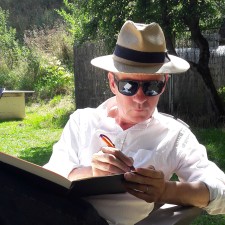
Tristram en Isolde
Tristram moest Isolde minnen,
de blauwe pil dwong hem ertoe.
Koning Mark wilde haar winnen,
op eigen kracht. Hij wist niet hoe.
De nevel drong de huizen binnen.
Haar lichaam deed de deuren toe.
Ze was klaar, zei ze, met minnen.
Ze hees haar rode zeil. Was moe.
Paul Bezembinder
Tristram en Isolde
Gedicht
Paul Bezembinder studeerde theoretische natuurkunde in Nijmegen. In zijn poëzie zoekt hij vooral in klassieke versvormen en thema’s naar de balans tussen serieuze poëzie, pastiche en smartlap. Bij uitgeverij Leeuwenhof (Oostburg) verschenen de bundels Gedichten (2020), Parkzicht (2020) en Duizelingen (2022). Website: www.paulbezembinder.nl.
• fleursdumal.nl magazine
More in: Archive A-B, Archive A-B, Bezembinder, Paul, Tristan & Isolde
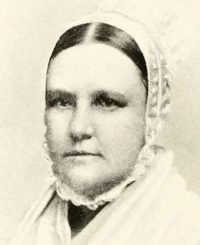
All Alone
Alas! they have left me all alone
By the receding tide;
But oh! the countless multitudes
Upon the other side!
The loved, the lost, the cherished ones,
Who dwelt with us awhile,
To scatter sunbeams on our path,
And make the desert smile.
The other side! how fair it is!
Its loveliness untold,
Its “every several gate a pearl,”
Its streets are paved with gold.
Its sun shall never more go down,
For there is no night there!
And oh! what heavenly melodies
Are floating through the air!
How sweet to join the ransomed ones
On the other side the flood,
And sing a song of praise to Him
Who washed us in His blood.
Ten thousand times ten thousand
Are hymning the new song!
O Father, join Thy weary child
To that triumphant throng!
But oh! I would be patient,
“My times are in Thy hand,”
“And glory, glory dwelleth
In Immanuel’s land.”
Eliza Paul Kirkbride Gurney
(1801 – 1888)
All Alone
• fleursdumal.nl magazine
More in: # Classic Poetry Archive, Archive G-H, Archive G-H
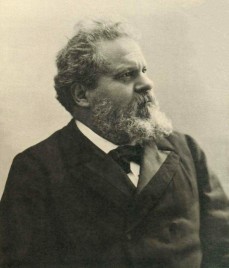
Madrigal
Breaking his way through the white clouds in the azure,
The sun laughs out and cries:
“O Springtime, come!”
Across the greening hills with placid murmurs
The streams sing back to the breeze:
“O Springtime, come!”
“O Springtime, come!” to his heart the poet is saying,
While gazing, O pure Lalage, in thine eyes!
Giosuè Carducci
(1835 – 1907)
Madrigal
• fleursdumal.nl magazine
More in: # Classic Poetry Archive, 4SEASONS#Spring, Archive C-D, Archive C-D

Spring Rain
I thought I had forgotten,
But it all came back again
To-night with the first spring thunder
In a rush of rain.
I remembered a darkened doorway
Where we stood while the storm swept by,
Thunder gripping the earth
And lightning scrawled on the sky.
The passing motor busses swayed,
For the street was a river of rain,
Lashed into little golden waves
In the lamp light’s stain.
With the wild spring rain and thunder
My heart was wild and gay;
Your eyes said more to me that night
Than your lips would ever say….
I thought I had forgotten,
But it all came back again
To-night with the first spring thunder
In a rush of rain.
Sara Teasdale
(1884-1933)
Spring Rain
• fleursdumal.nl magazine
More in: 4SEASONS#Spring, Archive Q-R, Archive S-T, Archive S-T, Teasdale, Sara
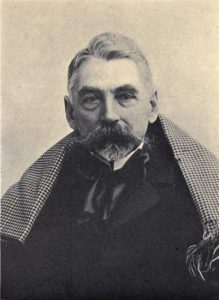
Si tu veux nous nous aimerons
Si tu veux nous nous aimerons
Avec tes lèvres sans le dire
Cette rose ne l’interromps
Qu’à verser un silence pire
Jamais de chants ne lancent prompts
Le scintillement du sourire
Si tu veux nous nous aimerons
Avec tes lèvres sans le dire
Muet muet entre les ronds
Sylphe dans la pourpre d’empire
Un baiser flambant se déchire
Jusqu’aux pointes des ailerons
Si tu veux nous nous aimerons.
Stéphane Mallarmé
(1842 – 1898)
Si tu veux nous nous aimerons
• fleursdumal.nl magazine
More in: Archive M-N, Archive M-N, Mallarmé, Stéphane, Mallarmé, Stéphane
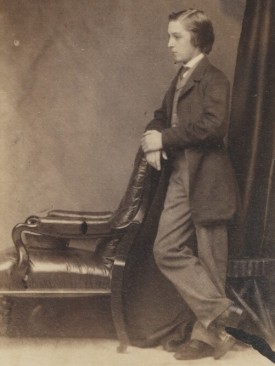
The child is father to the man
‘The child is father to the man.’
How can he be? The words are wild.
Suck any sense from that who can:
‘The child is father to the man.’
No; what the poet did write ran,
‘The man is father to the child.’
‘The child is father to the man!’
How can he be? The words are wild!
Gerard Manley Hopkins
(1844-1889)
‘The child is father to the man.’
• fleursdumal.nl magazine
More in: Archive G-H, Archive G-H, Hopkins, Gerard Manley

The Evening Star
Hail, pensile gem, that thus can softly gild
The starry coronal of quiet eve!
What frost-work fabrics man shall vainly build
Ere thou art doomed thy heavenly post to leave!
Bright star! thou seem’st to me a blest retreat,
The wearied pilgrim’s paradise of rest;
I love to think long-parted friends shall meet,
Blissful reunion! in thy tranquil breast.
I saw thee shine when life with me was young,
And fresh as fleet-winged time’s infantile hour,
When Hope her treacherous chaplet ’round me flung,
And daily twined a new-created flower.
I saw thee shine while yet the sacred smile
Of home and kindred round my path would play,
But Time, who loves our fairest joys to spoil,
Destined this hour of bloom to swift decay.
The buds, that then were wreathed around my heart,
Now breathe their hallowed sweetness there no more;
‘Twas thine to see them one by one depart,
And yet thou shinest brightly as before.
So, when this bosom, that ‘mid all its woes
Has longed thy little port of rest to win,
In the calm grave shall find at last repose,
Thou’lt beam as fair as though I ne’er had been.
Eliza Paul Kirkbride Gurney
(1801 – 1888)
The Evening Star
• fleursdumal.nl magazine
More in: # Classic Poetry Archive, Archive G-H, Archive G-H
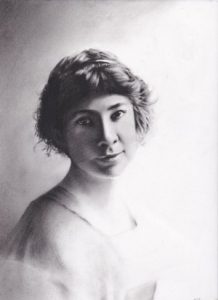
Spring Night
The park is filled with night and fog,
The veils are drawn about the world,
The drowsy lights along the paths
Are dim and pearled.
Gold and gleaming the empty streets,
Gold and gleaming the misty lake,
The mirrored lights like sunken swords,
Glimmer and shake.
Oh, is it not enough to be
Here with this beauty over me?
My throat should ache with praise, and I
Should kneel in joy beneath the sky.
O, beauty, are you not enough?
Why am I crying after love,
With youth, a singing voice, and eyes
To take earth’s wonder with surprise?
Why have I put off my pride,
Why am I unsatisfied,
I, for whom the pensive night
Binds her cloudy hair with light,
I, for whom all beauty burns
Like incense in a million urns?
O beauty, are you not enough?
Why am I crying after love?
Sara Teasdale
(1884-1933)
Spring Night
• fleursdumal.nl magazine
More in: 4SEASONS#Spring, Archive S-T, Archive S-T, Natural history, Teasdale, Sara

Watou Arts Festival 2024
makes room for imagination
The city of Poperinge, inspirator Koen Vanmechelen and curators James Putnam and Michaël Vandebril present the 2024 edition of Watou Arts Festival. ‘Landscape of the Imagination’ will take place from July 6 to September 1. Artists and poets will showcase the power of the imagination, in dialogue with each other and with several unique locations in and around the village and castle De Lovie.
Imagination as an engine of change
The new edition of the Watou Arts Festival focuses on the power of the imagination. After two successful editions, Koen Vanmechelen and Michaël Vandebril assume their role, for the third consecutive time, as respectively inspirer and curator of poetry. James Putnam, who has previously (in 2022) assumed the role of visual arts curator, completes the three-member curatorial team.
Many of the artists developed their works in dialogue with Watou’s locality. In the spring of 2023, a record number of 200 artists registered for the open call ‘Patchwwwork’. An international jury – chaired by Koen Vanmechelen and consisting of Dirk Draulans, Jo Coucke, Marjan Doom, James Putnam, Edith Doove, Michaël Vandebril, Sabiha Keyif and Loes Vandromme – selected the participants for the summer camp. Their ideas ‘flow’ from the landscape, which resulted in some twenty new realizations. As a result, theartworks are sometimes playful, but at the same time thought-provoking.
A selection of participating artists*:
Pato Bosich (CL) – Cecile Broekaert (BE) – Monique Broekman (NL) – Linde Carrijn & Dijf Sanders (BE) – Mat Collishaw (GB) – Matthijs De Block (BE) – Lieze De Middeleir (BE) – Werner de Valk (NL) – Joost Elschot (NL) – Karolina Halatek (PL) – Mariko Hori (JP) – John Isaacs (GB) – Lafleur & Bogaert (HT & BE) – Ilya Kabakov (RU) – Carel Lanters & Lee Eun Young (NL & KR) – Mashid Mohadjerin & Jan De Vroede (IR & BE) – Daan Navarrete-van der Pluijm (NL) – Alice Obee (BE) – Mikes Poppe (BE) – Roundhouse Platform (US) – Marina Resende Santos (BR) – Anila Rubiku (AL) – Sanne van Balen (NL) – Lieke van der Meer (NL) – Lie van der Werff (NL) – Laura Vandewynckel (BE) – Koen Vanmechelen (BE) *more to be announced
A selection of participating poets*:
Benno Barnard (NL) – Moya De Feyter (BE) – Dominique De Groen (BE) – Paul Demets (BE) – Al Galidi (NL) – Ingmar Heytze (NL) – Doina Ioanid (RO) – Frank Keizer (NL) – collectief Letterzetter (Imane Karroumi – Loeke Vanhoutteghem – Veronica Schmalz – Alice Boudry – Maite Vanthournout) (BE) –Jens Meijen (BE) – Carl Norac (BE) – Maria van Daalen (NL) – Marjolijn van Heemstra (NL) – Anke Verschueren (BE) – Billie Vos (BE) – Daniëlle Zawadi (NL) – Emma Zuiderveen (NL) *more to be announced
KUNSTENFESTIVAL / ARTSFESTIVAL / WATOU 2024
06/07 TM 01/09/2024
More on website:
https://www.kunstenfestivalwatou.be/
& https://www.poperinge.be/
fleursdumal.nl Magazine for Art & Literature
https://fleursdumal.nl/
More on website:
www.fleursdumal.nl
magazine for art & literature
More in: # Music Archive, #Modern Poetry Archive, #More Poetry Archives, Historia Belgica, Literary Events, Watou Kunstenfestival
In her new collection Who Will Make The Fire, published in association with New River Press, Bellamacina employs metaphors of wind, dawn, trees and fire to explore an interior world.
 A personal book about love, loss, nature, depression and recovery, the wind in Who Will Make The Fire becomes the biographer of the self; a way to trace this everevolving garden, that must die, again and again, like a wild bird shedding its unimaginable feathers.
A personal book about love, loss, nature, depression and recovery, the wind in Who Will Make The Fire becomes the biographer of the self; a way to trace this everevolving garden, that must die, again and again, like a wild bird shedding its unimaginable feathers.
Who Will Make The Fire questions what it is to really live, to live with stillness and fire; to combat the digital world and to get back to the earth and let the hidden circle of nature find its way back into the self.
‘Dreamlike, with bite. Bellamacina’s work is brutal, floral, blood-soaked and knowing, in the way that nature is both cruel and beautiful.’ ― Florence Welch
Greta Bellamacina published her first collection ‘Kaleidoscope’ in 2011. In 2014 she was short-listed as the Young Poet Laureate of London. In 2015 she edited ‘A Collection of Contemporary British Love Poetry’ a survey of British love poetry from Ted Hughes til now, it features the work of Wendy Cope, Emily Berry, Annie Freud and Sam Riviere. She has been a writer-in-residence at the Chateau Marmont Hotel in LA. and Andy Warhol’s Interview Magazine says Greta, ” is garnering critical acclaim for her way with words and her ability to translate the classic poetic form into the contemporary creative landscape.” Greta’s new collection “Perishing Tame” is a dazzling and frank meditation on motherhood, female identity, ennui and love. Greta and her work have featured in The Guardian, The Times, The Evening Standard, Dazed & Confused, I-D Magazine, Interview Magazine, British Vogue, Elle , Wonderland, and Hunger Magazine. She has performed her poetry on CNN, BBC World News, BBC Radio 4 , BBC London, BBC Radio 2 with Jonathan Ross and BBC Radio 3 on The Verb poetry show.
Greta Bellamacina:
Who Will Make the Fire
Publisher: Cheerio Publishing
Publication Date: 20 Jun. 2024
Language: English
Hardcover
ISBN-10: 1739440595
ISBN-13 978-1739440596
£12.99
• fleursdumal.nl magazine
More in: #Editors Choice Archiv, #Modern Poetry Archive, - Book News, - Bookstores, Archive A-B, Archive A-B, Bellamacina, Greta, Florence Welch

The Storm
I thought of you when I was wakened
By a wind that made me glad and afraid
Of the rushing, pouring sound of the sea
That the great trees made.
One thought in my mind went over and over
While the darkness shook and the leaves were thinned—
I thought it was you who had come to find me,
You were the wind.
Sara Teasdale
(1884-1933)
The Storm
from: Flame and Shadow
• fleursdumal.nl magazine
More in: #Editors Choice Archiv, Archive S-T, Archive S-T, Teasdale, Sara

Air and Angels
Twice or thrice had I lov’d thee,
Before I knew thy face or name;
So in a voice, so in a shapeless flame
Angels affect us oft, and worshipp’d be;
Still when, to where thou wert, I came,
Some lovely glorious nothing I did see.
But since my soul, whose child love is,
Takes limbs of flesh, and else could nothing do,
More subtle than the parent is
Love must not be, but take a body too;
And therefore what thou wert, and who,
I bid Love ask, and now
That it assume thy body, I allow,
And fix itself in thy lip, eye, and brow.
Whilst thus to ballast love I thought,
And so more steadily to have gone,
With wares which would sink admiration,
I saw I had love’s pinnace overfraught;
Ev’ry thy hair for love to work upon
Is much too much, some fitter must be sought;
For, nor in nothing, nor in things
Extreme, and scatt’ring bright, can love inhere;
Then, as an angel, face, and wings
Of air, not pure as it, yet pure, doth wear,
So thy love may be my love’s sphere;
Just such disparity
As is ‘twixt air and angels’ purity,
‘Twixt women’s love, and men’s, will ever be.
John Donne
(1572–1631)
Air and Angels
• fleursdumal.nl magazine
More in: Archive C-D, Archive C-D, Donne, John
Thank you for reading Fleurs du Mal - magazine for art & literature